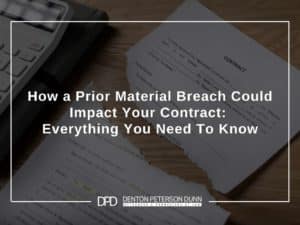
As a small business owner, you probably work with contracts on a regular basis, including contracts with your employees, your vendors, your building lease, for equipment that you are renting or borrowing, and even with your customers or clients. Although most of the time contracts are made in good faith and both parties uphold their side of the bargain for mutual benefit, sometimes problems arise and things become more complicated. What should you do when the other party fails to honor your agreement and violates your contract terms?
There are different ways that contracts can be violated, but one of the most common – and most significant – is a prior material breach of contract. Your Paradise Valley business attorney is ready to help you write contracts, understand contractual agreements you are considering, and discuss what actions you can take when your contracts have been breached. In the case of a prior material breach of contract, the violation will affect the future performance of the contract and may even change your legal obligation to fulfill the contract, so it’s beneficial to consult with your Arizona business lawyer for a full understanding of the situation as well as your rights and options.
A prior material breach of contract means that one party has violated the essence of the contract, which can ultimately discharge the other party from further contractual obligation. The crucial point of a prior material breach is that the violation goes against the essence of the contract. When one party fails to perform a minor technicality of the contract, the breach is considered non-material, and both parties are still obligated to uphold the terms of their arrangement. Prior material breaches of contract are usually factual. If you think you may be the victim of a prior material breach of contract, talk with your Glendale business attorney. The key is that the essential purpose and provision of the contract must have been breached.
Whether a contractual breach is material or non-material must be evaluated by careful examination, and will rely heavily on the intended purpose of the contract and whether the breach undermines that intention. A common example of a prior material breach of contract is when one party fails to perform their contractual obligation within the determined period of time, in a situation where timely performance is essential to the purpose of the contract.
In legal terms, time is considered to be of the essence when there is either an explicit clause in the contract, the subject matter of the contract clearly indicates that time is of the essence, or an express notice has been given to the other party requiring that the contract be fulfilled within a specified period of time. It’s also important to know whether the contract states that time is of the essence. Clauses regarding time are usually straightforward to identify because the contract will contain a specified time range or cutoff date. However, some contracts are less straightforward and will require greater analysis from a Chandler business lawyer who has experience with business contracts.
Failure to perform an obligation in a timely fashion may not be a prior material breach of contract if the time clause is not applicable to the specific breach. In other cases, time is less significant and not specified within the contract, and the failure to pay at all is the material breach of contract. Any failure to perform contractual obligations that are at the heart, essence, or intention of the contract constitute a material breach.
Generally speaking, a material breach of contract discharges non-breaching parties from their contractual obligations, but it’s always best to discuss the situation with your Arizona business attorney before taking any actions. As the non-breaching party, you also have the option to waive a material breach. For example, if the breaching party demonstrates improved performance, you may choose to waive the material breach and decide to move forward with upholding your side of the terms or release the breaching party from potential litigation.
Always consult with your Chandler business attorney before taking action. Although you may be discharged from upholding the contract as the non-breaching party, you may have other legal options available as well. Your attorney will need to carefully analyze the situation to determine whether the alleged breach of contract was material or non-material. If you consider waiving a material breach of contract, counsel with your attorney and other executives is imperative to make sure you are making the best decision for your business.
If your business is looking to enter into a contract, consult with the experienced attorneys at Denton Peterson Dunn. Our legal team has decades of experience working with the intricacies of Arizona business law and providing guidance for businesses. We can help your business draft contracts, determine your legal options after a breach of contract, and advise you on contract terms. To schedule your free consultation, contact our office today!
Brad Denton – Denton Peterson Dunn
1930 N Arboleda #200
Mesa, AZ 85213
Office: 480-660-3249
Email: brad@dentonpeterson.com
Website: https://arizonabusinesslawyeraz.com
7272 E Indian School Rd #540-132
Scottsdale, AZ 85251
Phone: 480-690-3283
Email: service@dentonpeterson.com
Are you dealing with labor law violations regarding trade secrets? Consult with employment law experts…
Wondering how to protect trade secrets in litigation? Learn strategies for early identification, specificity, and…
Want to protect your business from liability and disputes? Learn effective contractual tools and legal…
Concerned about embezzlement in your business? Learn how to safeguard against theft, understand legal distinctions,…
How is remote work reshaping commercial real estate? Explore how businesses are adapting leasing strategies,…
Is your business ready for remote work? Learn the legal considerations & best practices for…